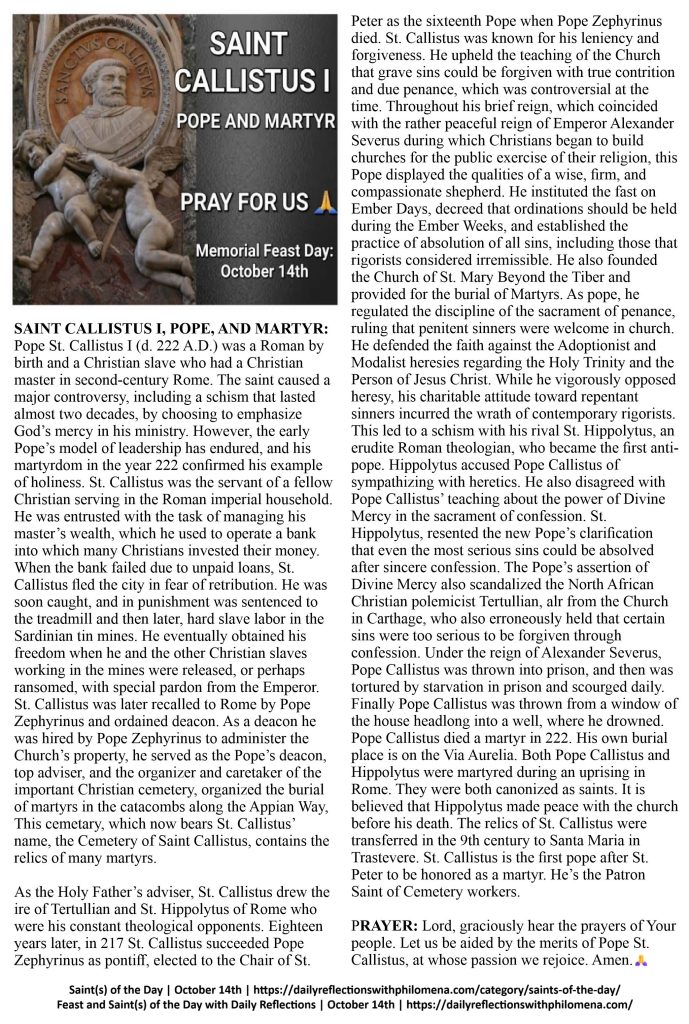
MEMORIAL OF SAINT CALLISTUS I, POPE, AND MARTYR ~ FEAST DAY: OCTOBER 14TH: Today, we celebrate the Memorial of Saint Callistus I, Pope, and Martyr. Through the intercession of our Blessed Mother Mary and the Saints on this feast day, we humbly pray for God’s Divine Grace and Mercy upon us all. We pray for peace, love, and unity in our marriages, our families, and our world. We pray for the poor, the needy, and the most vulnerable. We pray for the sick and dying, especially those who are mentally and physically ill and those suffering from cancers and other terminal diseases. We pray for the souls in Purgatory and the repose of the souls of the faithful departed. We pray for all widows and widowers. We pray for Cemetery Workers. And we continue to pray for our Holy Father, the Bishops, the Clergy, for vocations to the priesthood and religious life, for the Church, for persecuted christians, for the conversion of sinners, and Christians all over the world…. Amen🙏
SAINT CALLISTUS I, POPE, AND MARTYR: Pope St. Callistus I (d. 222 A.D.) was a Roman by birth and a Christian slave who had a Christian master in second-century Rome. The saint caused a major controversy, including a schism that lasted almost two decades, by choosing to emphasize God’s mercy in his ministry. However, the early Pope’s model of leadership has endured, and his martyrdom in the year 222 confirmed his example of holiness. St. Callistus was the servant of a fellow Christian serving in the Roman imperial household. He was entrusted with the task of managing his master’s wealth, which he used to operate a bank into which many Christians invested their money. When the bank failed due to unpaid loans, St. Callistus fled the city in fear of retribution. He was soon caught, and in punishment was sentenced to the treadmill and then later, hard slave labor in the Sardinian tin mines. He eventually obtained his freedom when he and the other Christian slaves working in the mines were released, or perhaps ransomed, with special pardon from the Emperor. St. Callistus was later recalled to Rome by Pope Zephyrinus and ordained deacon. As a deacon he was hired by Pope Zephyrinus to administer the Church’s property, he served as the Pope’s deacon, top adviser, and the organizer and caretaker of the important Christian cemetery, organized the burial of martyrs in the catacombs along the Appian Way, This cemetary, which now bears St. Callistus’ name, the Cemetery of Saint Callistus, contains the relics of many martyrs.
As the Holy Father’s adviser, St. Callistus drew the ire of Tertullian and St. Hippolytus of Rome who were his constant theological opponents. Eighteen years later, in 217 St. Callistus succeeded Pope Zephyrinus as pontiff, elected to the Chair of St. Peter as the sixteenth Pope when Pope Zephyrinus died. St. Callistus was known for his leniency and forgiveness. He upheld the teaching of the Church that grave sins could be forgiven with true contrition and due penance, which was controversial at the time. Throughout his brief reign, which coincided with the rather peaceful reign of Emperor Alexander Severus during which Christians began to build churches for the public exercise of their religion, this Pope displayed the qualities of a wise, firm, and compassionate shepherd. He instituted the fast on Ember Days, decreed that ordinations should be held during the Ember Weeks, and established the practice of absolution of all sins, including those that rigorists considered irremissible. He also founded the Church of St. Mary Beyond the Tiber and provided for the burial of Martyrs. As pope, he regulated the discipline of the sacrament of penance, ruling that penitent sinners were welcome in church. He defended the faith against the Adoptionist and Modalist heresies regarding the Holy Trinity and the Person of Jesus Christ. While he vigorously opposed heresy, his charitable attitude toward repentant sinners incurred the wrath of contemporary rigorists. This led to a schism with his rival St. Hippolytus, an erudite Roman theologian, who became the first anti-pope. Hippolytus accused Pope Callistus of sympathizing with heretics. He also disagreed with Pope Callistus’ teaching about the power of Divine Mercy in the sacrament of confession. St. Hippolytus, resented the new Pope’s clarification that even the most serious sins could be absolved after sincere confession. The Pope’s assertion of Divine Mercy also scandalized the North African Christian polemicist Tertullian, alr from the Church in Carthage, who also erroneously held that certain sins were too serious to be forgiven through confession. Under the reign of Alexander Severus, Pope Callistus was thrown into prison, and then was tortured by starvation in prison and scourged daily. Finally Pope Callistus was thrown from a window of the house headlong into a well, where he drowned. Pope Callistus died a martyr in 222. His own burial place is on the Via Aurelia. Both Pope Callistus and Hippolytus were martyred during an uprising in Rome. They were both canonized as saints. It is believed that Hippolytus made peace with the church before his death. The relics of St. Callistus were transferred in the 9th century to Santa Maria in Trastevere. St. Callistus is the first pope after St. Peter to be honored as a martyr. He’s the Patron Saint of Cemetery workers.
PRAYER: Lord, graciously hear the prayers of Your people. Let us be aided by the merits of Pope St. Callistus, at whose passion we rejoice. Amen. 🙏